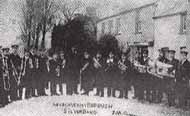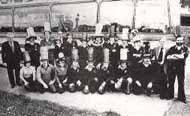History of Abergavenny Borough Band
Introduction
In August 1962, the Abergavenny Borough Band suffered a severe blow when the band room was destroyed by fire. In addition to two-thirds of the instruments and the music library, all of the documents pertaining to the band's history and transactions were lost forever.
To trace the history of the Band, without any authenticating records was never going to be easy, but was achieved by the late Chairman, F.W. Parry, affectionately known as Bill. In his book, "The History of Abergavenny Bands", Bill pieced together his own memories of historical documents which were burnt in the fire and other information, such as photographs and newspaper clippings which people handed to him over the years. The result was a comprehensive historical account of the development of brass bands in the town of Abergavenny.
This account is a brief summary of the history of the Band, using extracts from Bill's book.
A Brief Summary
The true origins of Abergavenny's town band lie shrouded in mystery, but what is know that there was certainly a band in the town before 1884. In fact the Abergavenny Chronicle reports on the Band participating in a procession through the town and up the Sugar Loaf Mountain playng from a horse drawn "Break" on Whit Monday 6th June 1881. An account of this can be found in "Abergavenny-Historic Market Town" by Chris Barber, Blorenge Books 2011; p229. An extract from the book can be seen by clicking here and is reproduced by kind permission of the author.

The oldest record dates back to 1884, when a Mr. Thomas Hardy, formerly of the Hussars took over the job of directing the then Abergavenny town band.
Records show that 1906 was an important year for the Band in that it marked the first time that the title Borough Band started to be used. During 1906, Earl Roberts of Handohar, the Commander in Chief of the British forces during the Boer War visited the town. The town band, as it then was, provided the music for his visit and also headed the parade. To mark their efforts, the Band were rewarded by being allowed to use the Borough Coat of Arms and call themselves the Borough Silver Band.
In the 1920s the Band faced one of its biggest crises. Following World War I, the Band had been appointed to serve as the 3rd Mons Battalion Regimental Band, and provided with a new set of instruments. In 1922, the Regiment amalgamated with the Breconshire Regiment leaving the Band redundant - and without instruments.
A public appeal launched by Band president and local jeweller Harry Lyons, raised money to buy back the military instruments. As these were not silver plated, the Band again changed its name to the familiar Abergavenny Borough Band.
 For the next 40 years, the Band was a prominent feature of town life, with regular contests at the Castle and concerts in and around the town.
For the next 40 years, the Band was a prominent feature of town life, with regular contests at the Castle and concerts in and around the town.
The years 1939 - 46, which proved disastrous for so many local bands, proved less so for Abergavenny. Although many players were called up, troops stationed in the town became temporary band members. At a time when bands all over the country were folding, Abergavenny Borough Band thrived.
In 1962 the existence of the Band was threatened when, early in the morning of August 29, a "mysterious" fire broke out in the Band's Fairfield rehearsal room, destroying almost all its instruments, music and records. A massive fund raising drive supported by local people, other bands and music firms, meant that the Band was able to continue.
In his book, "Abergavenny Brass Bands", Bill Parry, the Band's late chairman recalls "the fire was a severe blow, but also the beginning of a new era as out of the ashes has risen the best band the town has ever known".
 It was shortly after the near disastrous fire of 1962 that Eric Powell was invited to join Abergavenny Borough Band as tutor to the emerging youth section. Under Eric's guidance the youth band grew in popularity until in 1966, on the death of bandmaster Bryn Kirby, he was asked to take over the baton of the senior band.
It was shortly after the near disastrous fire of 1962 that Eric Powell was invited to join Abergavenny Borough Band as tutor to the emerging youth section. Under Eric's guidance the youth band grew in popularity until in 1966, on the death of bandmaster Bryn Kirby, he was asked to take over the baton of the senior band.
Despite a long contesting history, dating back to Crystal Palace in the early 1900s, the Band had virtually given up taking part in contests, something Eric sought to rectify.
By 1969, the Band had a lot of very enthusiastic youngsters and were ready to start contesting again, although the Band crossed the border to Gloucester to start off.
 By 1972 the Band had entered the Welsh Regional Championships and took second prize at the Brangwyn Hall in Swansea - qualifying to represent Wales at the National Championships later that year. This was the first of twelve subsequent appearances at the National Championships.
By 1972 the Band had entered the Welsh Regional Championships and took second prize at the Brangwyn Hall in Swansea - qualifying to represent Wales at the National Championships later that year. This was the first of twelve subsequent appearances at the National Championships.
Over the next ten years the Band moved up through the various sections until in 1982, it reached the championship section. Since 1982, the Band has maintained its position in either the first or championship sections.
Eric remained at the helm of the Band for 38 years, retiring from contesting in 1997, although he continued to conduct for non-competitive engagements for some time after this.
Following Eric's retirement from contesting the Band were then priviledged to work with a range of professional conductors including Steve Sykes, Brian Howard and Philip Harper. In 2002, the Band were also fortunate enough to secure the conducting services of a very young David Childs for the Welsh Regionals. This was David's competitive conducting debut, and he successfully lead the Band to first prize.
Lyndon Price from Ebbw Vale, took over position of bandmaster from Eric in August 2002, a position he held until December 2003. Following Lyndon's resignation the Band then turned to Alun F. Williams, who held the position until May 2006. In August 2006, the Band appointed Colin Hogg, folowed by Tudor Williams in 2007. Gareth Ritter joined in 2008 and was MD until November 2009. The Band then engaged the services Paul Holland and Steve Sykes as guest conductors until David Griffiths was appointed MD in October 2010. The next Musical Director was Craig Roberts who marked his debut contest by winning at Ebbw Vale in May 2011. Alun F Williams joined the Band as MD in 2015 before the present MD who was appointed in 2016.
Sean O'Neil ARCM (Honours), was appointed MD in November 2016 when he was head of Brass & Wind at Gwent Music Support Service; Resident Conductor at that time was Lana Tingay who is also MD of the Youth Band.
Appointed to the potion of MD in November 2019 is Lana Tingay. Her professional qualifications include a Bachelor of Arts (BA) degree in Music and a BA (with Honours) degree in Brass Band Studies.
Website Editor1st December 2019